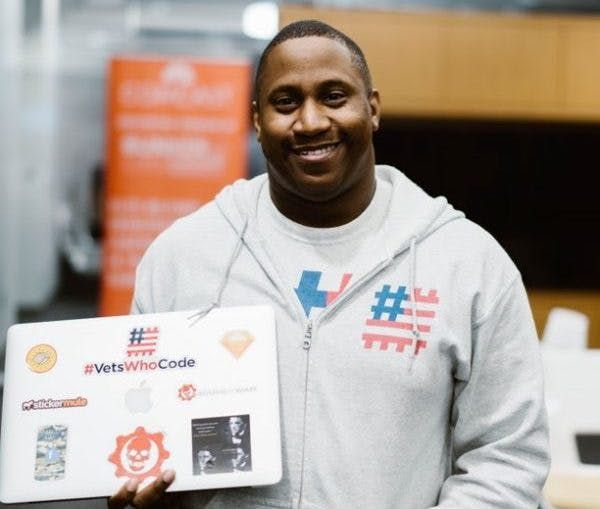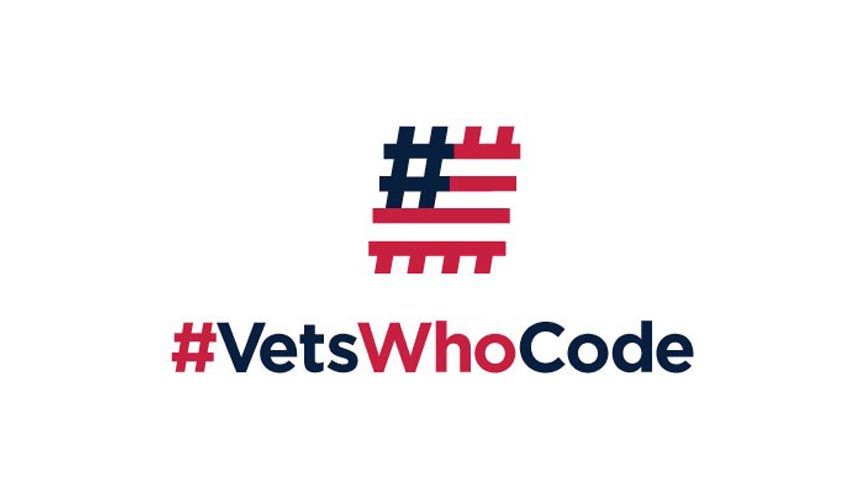Veterans Day Spotlight: Vets Who Code
There's a well-known saying that if you teach a man to fish, you will feed him for a lifetime. Air Force veteran Jerome Hardaway knows this saying well. As the founder and executive director of the nonprofit organization Vets Who Code, he has used this principle as a launchpad to equip veterans and military spouses with skills in front-end web development to help them ease into new careers -- as well as start businesses of their own -- since 2014. Learn more about Jerome and Vets Who Code in this exclusive interview.

Tell us about Vets Who Code and the purpose behind starting the organization. #
Roger that. The purpose of starting Vets Who Code was pretty simple. If you look at [a United States] map, most military installations aren't in really big tech spaces. So the things I wanted to learn that had the easiest point of entry weren't available to learn. And if I didn't go the degree route or another crazy route, I wasn't going to be able to get into the tech industry.
I ended up getting lucky and getting a scholarship to go to New York, and trained and learned how to program while after I already gained some programming experience. But what I wanted to do is negate that, because no one should have to leave their family to have to learn how to program, especially with the world of the internet. I decided that I was going to create Vets Who Code, which was going to be a distributed non-profit. We were actually the first distributed non-profit that focused on making the web our home with a deep focus on the JavaScript ecosystem because it was the lowest level technology out there that was the most versatile. That's just how things happened.
When did you first get the bug for coding? #
I got out of the military in 2010, and I was like "yo, these jobs that they're offering me are either jobs that I'm overqualified for or the jobs I am qualified for aren't hiring." Because [the country] was in the middle of a recession, I knew I needed to "skill up" fast if I wanted to get more opportunities. So I did all this research and I saw this commercial about going to, I think ITT or some crazy private for-profit college that probably isn't around anymore, and they were talking to me about coding and SQL and I was like, "what's that?" I started researching more; I had a book that I picked up from someone while I was in the desert on PostgreSQL and I ended up teaching myself PostgreSQL and from there ended up getting my first job as a certified TWIC agent with the U.S. Department of Homeland Security with a focus on handling their databases.
So I was in there adding and doing all these joins and selections and additions and deletions to their databases and I was like "oh, okay, this is a good salary. I'm in air conditioning. No one's trying to blow me up or shoot me. So this is pretty cool, I can do this." I started focusing on LAMP stack, which helped me start with PHP, and from there, I learned a lot of Ruby on Rails. I moved back home and got a senior Ruby on Rails position. It was a real trial by fire, but I learned I was able to keep up and I was able to do well.
Then I started learning JavaScript and React and I've been on the JavaScript and React train since. I love the deep dive into UI, going more into React and UX and web accessibility, and design systems. You start realizing that there are more layers to each component before you even get to the data portion.
I do a lot of UI and UX stuff now because I'm not a fan of context switching. I have what I call the "3:00am rule." Say someone woke you up at 3:00am and said, "do this for free," but it doesn't make you mad. UI and UX is that thing that for me.
What are some of the advantages of hiring vets for the tech industry? #
Discipline and focus. That's a no brainer. Veterans are self-starters; we don't have to look or need to wait to be told to do something. We're just going to go do it.
Then, just problem solving. A lot of people think that people who are in the military don't solve problems well, especially if they're enlisted. That is the furthest thing from the truth, because the mission has to be completed, and you rarely have every tool you need to complete your mission. Those are just a few of the qualities that I can think of that make us an advantageous and eager group for tech companies.
What are some of the success stories of vets who have gone through the program? #
Our head of UX, , came to us as a graphic designer two or three years ago, and now she's a senior developer at a company in Chicago. She's actually one of the few veterans who has gone from entry level to retirement as Vets Who Code has progressed. She's one of a few veterans that we have consistently been able to help get jobs and level up through her entire career.
Another great success story is . We helped him get his first job at Microsoft with a focus on JavaScript, Node.js, and Azure. He was just recently promoted as a DevOps engineer, and that's a testament of how versatile JavaScript is. Because we only focus on JavaScript and everything he learned was through us, he's been able to transition from a support engineer to a DevOps engineer, consistently moving through the scope of work while coming to us for help. Our team members have mentored him and drilled him to help him prep for his interviews at Microsoft on both occasions.
Now there's a lot of different programs that are out there for people who want to learn how to code and get a job in the tech industry. Earlier, you mentioned for-profit colleges, but there's also places like General Assembly. #
Bootcamps. Yeah.
Right. Are there any unique challenges that Vets Who Code face as an organization when it comes to these other programs? #
Yes and no. Because we're a non-profit and we don't charge our veterans, sometimes a bootcamp will try to target our veterans because they know that we're not using their GI bill. But it hasn't worked because we're just better. [laughs]
It's the same way Silicon Valley recruits when it comes to startups. There's a practice called pattern matching where they are looking for the guy that looks and sounds like Mark Zuckerberg or Steve Jobs. That actually works for us because what better person to teach you how to go from an M4 carbine to a MacBook Pro then a person that went from a M4 carbine to a MacBook Pro? That really is our number one advantage for veterans over a lot of the for-profit code schools, colleges, and universities.
Also, 80% of our team are veterans. Our head of mentorship is a veteran; he's also a Rails engineer for the government. Our head of prework is a veteran. He's also an Angular on Rails engineer for NBC. I'm a veteran; I also work at CBS. Carla, she's a veteran. Our head of product; he's a veteran who works at Verizon. Everybody at Vets Who Code who you'll interact with will be able to help you through your journey because they have been where you at every step, all the way. There's a lot more understanding, like "Hey, I know what you're going through. I've been through this."
For instance, our head of product started his journey with us. He was a Special Forces candidate looking to get out of the Army, and was also a D1 athlete in college for cheerleading. He ended up being under contract to teach cheerleading in Greenland, met the love of his life, stayed there for five years but had to come back home cause of health issues. However, he didn't have a transferable skill. We ended up teaching him while he was in Greenland and helping him transition with his wife from Greenland to Texas and he ended up getting his current job at Verizon. These are stories that we have that for-profit schools just can't compete with.
There's also the story of **Osvaldo Varga**s; he's head of his own dev shop. Two years ago, he was going through things with his family, and he was pushing himself so hard. I saw him [online] on a Friday night at 10:00 PM once, and I called him up and told him go to bed. Very few code schools or organizations have that level of compassion or community. Does their leadership have that level of insight to understand? To be acutely aware of what their students are going through? To be able to say, "you need to rest" or "I understand this is where you're coming from. Because I've been there too." That's always been our advantage.
How can people help with supporting Vets Who Code? #
Roger that. One of the biggest ways people can support what we're doing with Vets Who Code is to donate. As a 501(c)(3) non-profit, a charity organization, we rely 100% on donations. People can also support us through our HashFlag Shop; all proceeds go to our organization.
We're also planning some really cool things in 2020. We want to take six veterans to RenderATL, and we're trying to make sure that we can fly them out so they don't have to spend a dime. We also have UndergroundJS coming up that we're trying to bring veterans to. For 2020, we want to push our veterans into the real world. We're very excited.
People can also follow us on Twitter. But most importantly, hire our veterans.
This interview has been edited and condensed for clarity.

